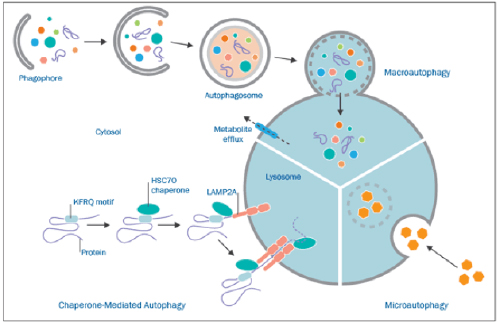Source: Fierce Biotech Jul 13, 2018 6 years, 9 months, 1 week, 6 days, 11 hours, 4 minutes ago
Scientists at UT Southwestern Medical School have spent the last two decades studying autophagy, the process cells use to throw out toxic substances that endanger their health. They discovered autophagy not only helps the body fight off infections, but it also protects against many age-related diseases such as cancer and neurological disorders.
Autophagy
The findings raised a question: Could boosting natural levels of autophagy be a safe way to
improve health and extend life? A new study in mice, published in the journal Nature, suggests it might.
To answer the question, the researchers genetically engineered mice to have a mutation in a protein called beclin 1. The UT Southwestern team had previously discovered that the gene that makes this protein drives autophagy, and that mutating it prevents it from binding to an autophagy-inhibiting protein called Bcl-2. The mutation resulted in mice born with persistently high levels of autophagy.
The result: The animals lived 10% longer than normal mice and were less likely to develop heart disease, kidney problems and age-related cancer, according to a
statement from the university.
The research builds on previous studies showing the genetically engineered mice seem to be protected against the natural decline in autophagy that occurs with age. A year ago, the UT Southwestern team reported that the engineered mice were less likely to develop Alzheimer’s disease.
In the new study, the scientists observed that mice with increased levels of autophagy are protected from the loss of klotho—a hormone that has been proven to regulate metabolism and longevity. Klotho is the target of several research programs aimed at combating diseases of aging, and it inspired the
startup Klogene, which is working on new approaches to treating Alzheimer’s.
The next step for the UT Southwestern scientists is to
develop drugs that disrupt the ability of beclin 1 to bind to Bcl-2, thereby increasing autophagy.
"These studies have important implications for human health and for the development of drugs to improve it," said Beth Levine, M.D., director of the Center for Autophagy Research at UT Southwestern, in the statement. "They show that strategies to increase the cellular housekeeping pathway of autophagy may retard aging and aging-related diseases.”
Reference: Fierce Biotech
